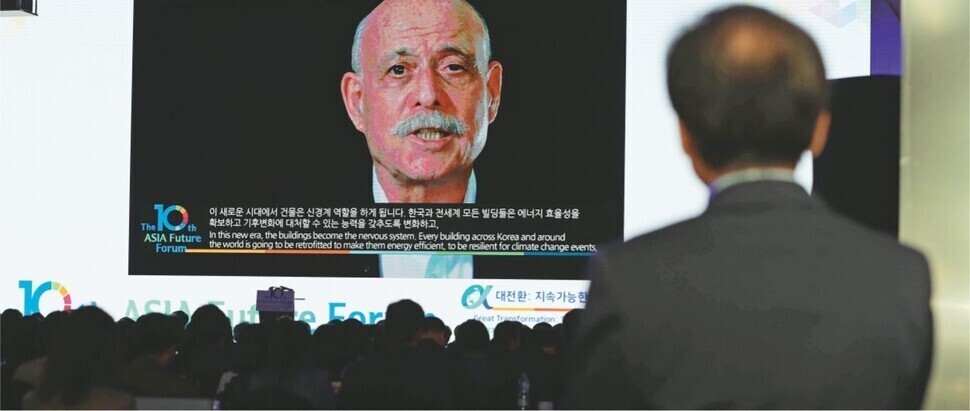hankyoreh
Links to other country sites 다른 나라 사이트 링크
Renowned US scholar says S. Korea has potential to be leader in Green New Deal

Jeremy Rifkin, president of the Foundation on Economic Trends and a world-renowned scholar who has authored such books as “The Green New Deal,” “The Hydrogen Economy,” and “The Age of Access,” said that South Korea has the capabilities to be a leader in the Green New Deal but is still bound by outdated systems.
Rifkin’s comments came in a keynote speech delivered via video at a “Green New Deal Discussion for an Era of Overcoming Climate Crisis and Achieving Zero Carbon” held at the National Assembly Members’ Office Building in Seoul’s Yeouido neighborhood on June 10. Stressing the need for a revolution in communications, energy, and transportation infrastructure to overcome the climate crisis and achieve an economic paradigm shift, he observed that South Korea already possesses some of the world’s top infrastructure in the communications and transportation fields and could be a leader in the Third Industrial Revolution and overcoming the climate crisis once the Green New Deal is pursued in earnest.
The “Third Industrial Revolution” mentioned by Rifkin was in reference to the information and communications revolution that has unfolded with developments in the internet during the 21st century, which comes after the First Industrial Revolution in Great Britain during the 19th century and the Second Industrial Revolution in the US during the 20th. At the same time, he commented that while many South Korean businesses have the capabilities to lead the shift, the Korea Electric Power Corporation (KEPCO) and other energy enterprises lag far behind and are still bound to outdated energy systems. He also expressed concern about South Korea being heavily dependent on fossil fuels.
Stressing the need to plan an energy transition that will continue for around 40 years, Rifkin predicted that South Korea could establish infrastructure to achieve zero carbon emissions within the next 20 years. He went on to call for greater pressure on the Moon Jae-in administration to pursue more ambitious changes.
Attendees at the discussion that day included Democratic Party leader Lee Hae-chan; Lee Nak-yeon, chairperson of the novel coronavirus national disaster response committee; Cho Jeong-sik, chairperson of the policy committee; Kim Sung-hwan, director of the Korean New Deal task force within the disaster response committee; lawmakers Yang-Yi Won-young and Lee So-young; Minister of Environment Cho Myung-rae; Vice Minister of Trade, Industry and Energy Cheong Seung-il; and Seoul Institute President Seo Wang-jin.
By Choi Woo-ri, staff reporter
Please direct comments or questions to [english@hani.co.kr]

Editorial・opinion
![[Editorial] Penalties for airing allegations against Korea’s first lady endanger free press [Editorial] Penalties for airing allegations against Korea’s first lady endanger free press](https://flexible.img.hani.co.kr/flexible/normal/500/300/imgdb/original/2024/0502/1817146398095106.jpg) [Editorial] Penalties for airing allegations against Korea’s first lady endanger free press
[Editorial] Penalties for airing allegations against Korea’s first lady endanger free press![[Editorial] Yoon must halt procurement of SM-3 interceptor missiles [Editorial] Yoon must halt procurement of SM-3 interceptor missiles](https://flexible.img.hani.co.kr/flexible/normal/500/300/imgdb/child/2024/0501/17145495551605_1717145495195344.jpg) [Editorial] Yoon must halt procurement of SM-3 interceptor missiles
[Editorial] Yoon must halt procurement of SM-3 interceptor missiles- [Guest essay] Maybe Korea’s rapid population decline is an opportunity, not a crisis
- [Column] Can Yoon steer diplomacy with Russia, China back on track?
- [Column] Season 2 of special prosecutor probe may be coming to Korea soon
- [Column] Park Geun-hye déjà vu in Yoon Suk-yeol
- [Editorial] New weight of N. Korea’s nuclear threats makes dialogue all the more urgent
- [Guest essay] The real reason Korea’s new right wants to dub Rhee a founding father
- [Column] ‘Choson’: Is it time we start referring to N. Korea in its own terms?
- [Editorial] Japan’s rewriting of history with Korea has gone too far
Most viewed articles
- 1Months and months of overdue wages are pushing migrant workers in Korea into debt
- 2[Editorial] Penalties for airing allegations against Korea’s first lady endanger free press
- 3Bills for Itaewon crush inquiry, special counsel probe into Marine’s death pass National Assembly
- 4Trump asks why US would defend Korea, hints at hiking Seoul’s defense cost burden
- 560% of young Koreans see no need to have kids after marriage
- 6S. Korea discusses participation in defense development with AUKUS alliance
- 7Korean firms cut costs, work overtime amid global economic uncertainties
- 8[Reporter’s notebook] In Min’s world, she’s the artist — and NewJeans is her art
- 9[Guest essay] Maybe Korea’s rapid population decline is an opportunity, not a crisis
- 101 in 3 S. Korean security experts support nuclear armament, CSIS finds